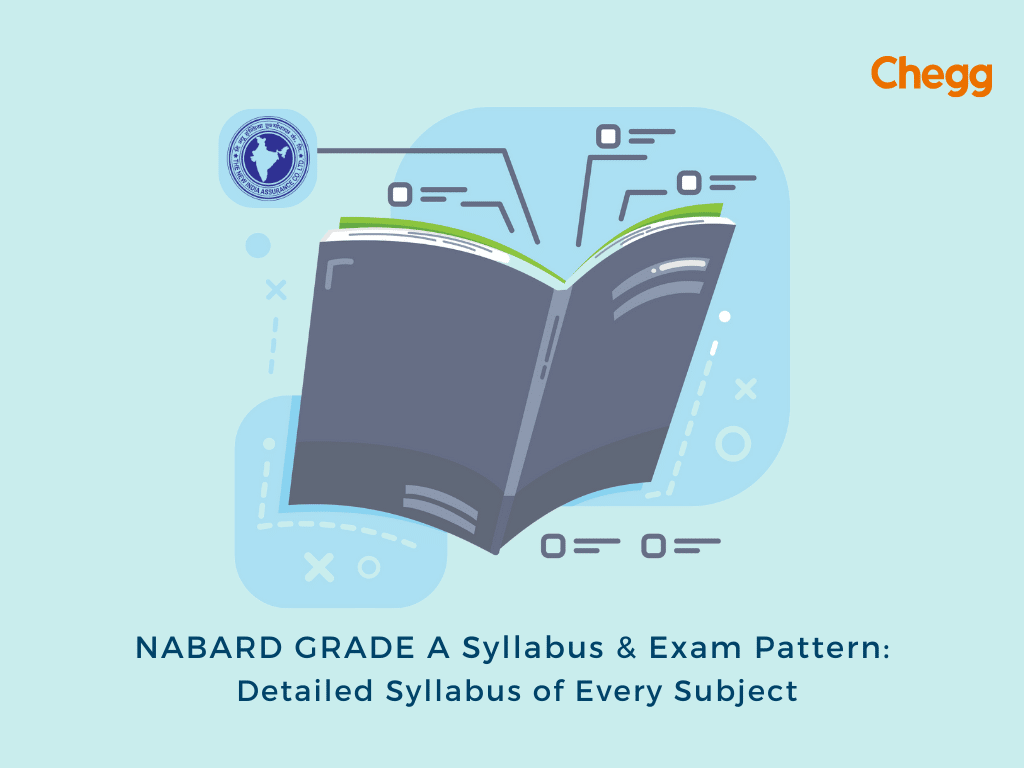NABARD GRADE A Syllabus & Exam Pattern 2023: Detailed Syllabus of Every Subject

Table of Contents
Table of Contents
NABARD stands for National Bank for Agriculture and Rural Development. The NABARD Grade A exam is conducted to select Assistant Managers in different bank sectors. The exam checks the knowledge, skills and potential of the applicant. The applicants must know the Exam Pattern and NABARD Grade A Syllabus to ace it. The Exam is conducted in two phases: Preliminary and Main. An interview follows it.
The Exam Pattern and Syllabus of NABARD Grade A can help the candidates recognize their weaknesses and strengths. Thus. This blog aims to provide the candidates with a detailed knowledge of the NABARD Grade A exam pattern and syllabus. It also covers significant topics related to each subject.

Highlights on NABARD Grade A Exam Pattern for 2023
The table helps identify the important points related to the NABARD Grade A Exam.
| Phases of Selection | PrelimsMainsInterview |
| Question-Type | Prelims: 120 minutes: 90 minutes (Paper-I) and 120 minutes (Paper II) |
| Number of Questions | Prelims: 200 Mains: 37 |
| Total Marks | Prelims: 200 Mains: 37 |
| Total Time | Prelims: 120 minutes. Mains: 90 minutes (Paper I) and 120 minutes (Paper II) |
| Scheme of Marking | Prelims: negative marking of 0.25 marks |
The official notice for the NABARD Grade A Exam has not yet been released. It is expected to be released soon. This notice will contain information about the exam pattern, dates, syllabus, eligibility criteria, and other essential details.
Candidates should watch for the release of the official notification to stay informed about the exam.
Understanding the NABARD Grade A Syllabus for 2023
NABARD Grade A Syllabus for Prelims Exam
It is crucial to ace the Syllabus of the NABARD Grade A Exam. We tell the aspirants to prepare important topics first. The Syllabus for Prelims includes the following subjects:
| Subjects | Topics |
| Reasoning Ability | 1 Syllogism 2 Seating Arrangements and Puzzles 3 Verbal Reasoning 4 Blood Relations 5 Coding-Decoding 6 Input-Output 7 Data Sufficiency. |
| English | 1 Reading Comprehension 2 Cloze test 3 Sentence improvement 4 Detecting the mistakes 5 Complete the gaps 6 Sentence rearrangement 7 Para Jumbles |
| Quantitative Aptitude | The important topics include: 1 Data Interpretation 2 Quadratic Equations 3 Number Series 4 Simplification/ Approximation 5 Data Sufficiency 6 Arithmetic Questions 7 Quantity Comparisons 8 Mathematical Inequalities |
| Knowledge of Computer | The important topics include: 1 Networking 2 Devices for input-output 3 Microsoft Office, DBMS 4 Internet 5 Generations and computing history 6 Shortcuts |
| General Awareness | The important topics include: 1 Banking 2 Insurance 3 Current Affairs: honours and awards, latest appointments, sports, new schemes, developments in science and technology, national and international news. |

NABARD Grade A Syllabus for Mains Exam
Phase 2 of the NABARD Grade A Exam includes subject-centric questions. Thus, the candidates need to be well-versed in all the essential elements. Phase II of the Exam includes:
- Online Descriptive Test – Paper-I
- Online Objective Test – Paper II
English (Paper 1)
The list of the different chapters covered under the English Paper of the NABARD Grade A Syllabus Exam is mentioned below.
| S. No. | Chapter |
| 1. | Essay Writing |
| 2. | Précis writing |
| 3. | Comprehension |
| 4. | Office/Business Correspondence |
Some tips to ace the English Section are:
- Focus on improving reading speed and comprehension.
- Improving Vocabulary can be helpful by reading extensively.
- Give grammar exercises to improve grammar.
Economics & Social Issues (Paper 2)
Another subject for the NABARD Grade A Exam is Economic and Social Issues. The important chapters are given below.
| Chapter | Details |
| Indian Economy | 1 Globalization 2 Privatization 3 Indian Economic Reforms 4 Underdevelopment of the Economy 5 Opening of the Economy of India |
| Inflation | Trends and Impact of Inflation on the National Economy and Income of Individual |
| Agriculture | 1 Performance of the Agriculture 2 Agriculture in India 3 Indian food security and their issues 4 Rural credit institutions and non-institutional organizations |
| Population | 1 Economic Development and Population Growth 2 The policy of Population in India |
| Employment Generation and Poverty Alleviation | 1 Urban and Rural 2 Poverty Measurement 3 Governmental poverty alleviation programs |
| Industry | 1 Labour and Industrial Policy 2 Industrial Results 3 Regional Inequality in India’s Industrial Development 4 Public Sector Enterprise |
| Economic Globalization | 1 World Bank and IMF 2 WTO |
| Education | 1 Social Reformations 2 Political Systems in India |
| positive discrimination on the side of the disadvantaged | 1 Social Reformations 2 Political systems in India |
| Social Justice | 1 SC and ST Problems 2 Socio-economic programs for SC, ST and OBCs |
Some tips to ace the Social and Economic Problems Section are:
- Have the right study material as per the syllabus
- Manage your time and focus on important topics.
- Practice through Question Bank.
Agriculture (Paper 2)
The syllabus for Agriculture for the NABARD Grade A Exam is mentioned below.
| Topic | Details |
| Agriculture | 1 Definition, meaning, scope and branches of Agronomy. 2 Field Crop Classification 3 Influencing factors for crop production 4 Agriculture Climate Zones 5 Dry Land Problems 6 Meteorology 7 Organic Farming 8 Precision Farming |
| Water and soil preservation | 1 Types of Soil 2 Fertility of Soil 3 Soil Erosion 4 Watershed management 5 Fertilizers |
| Water Resources | 1 Irrigation Management 2 Irrigation types 3 Irrigation sources 4 Crops’ water needs 5 Command area expansion 6 Techniques of Water conservation 7 Micro-irrigation 8 Sprinkler pumps |
| Agricultural engineering | 1 Agriculture and Power 2 electricity sources on the farm 3 Buildings for Water Harvesting 4 Field Ponds 5 Agro-Processing 6 Perishable food storage, controlled and modified storage |
| Horticulture and Plantation | 1 Resources for fishing 2 Freshwater, brackish water, and marine resource management 3 Both inland and marine aquaculture 4 Biotechnology 5 Post-harvest innovation 6 Indian fisheries are important. 7 Slang is used frequently in the seafood industry. |
| Livestock management | 1 The value of farm animals to India’s economy 2 Indian animal husbandry practices 3 Terms used often to describe various animal species 4 Cattle breeds are classified for practical purposes. 5 Introduction to popular feeds and fodders, including a discussion of their use. 6 An introduction to India’s poultry industry (past, present, and future status) 7 Typical expressions used in the production and administration of poultry 8 The idea of mixed farming and its applicability to Indian farmers’ socioeconomic circumstances 9 Livestock and poultry production are complementary to and required by agricultural cultivation. |
| Fisheries | 1 Resources for fishing 2 Freshwater, brackish water, and marine resource management 3 Both inland and marine aquaculture 4 Biotechnology 5 Post-harvest innovation 6 Indian fisheries are important. 7 Slang used frequently in the seafood industry. |
| Forestry | 1 Fundamental Forestry and Forestry ideas 2 Silviculture, forest measurement, forest management, and forest economics principles 3 Social forestry, agroforestry, and cooperative forest management concepts 4 India’s forest legislation and policies 2015 Status of Forest Report 5 The Ministry of Environment, Forest, and Climate Change’s most recent developments. |
| Farming Extensions | 1 Its significance, its function, and the criteria for evaluating extension initiatives 2 What part does Krishi Vigyan Kendra (KVK) play in promoting agricultural technologies? |
| Ecological Change and Climate | 1 The importance of ecology to humankind, the environment, natural resources, sustainable management, and conservation 2 Causes of climate change, key nations that release the most greenhouse gases (GHG), and climate analysis 3 Differentiate between mitigation and adaptation. 4 Impact of climate change on rural and agricultural livelihoods 5 Credit for carbon 6 Meetings of the IPCC, UNFCCC, and CoP 7 Funding sources for climate change initiatives 8 Government of India, NAPCC, SAPCC, and INDC initiatives. |
| Indian agriculture’s current state and related activities | 1 Current patterns 2 Agriculture’s biggest issues and solutions 3 Agriculture’s ability to succeed 4 Agriculture’s production factors 5 Agriculture Marketing and Finance 6 Globalization’s effects on Indian agriculture and food security concerns 7 Concept and Farm Management Types. |
NABARD Grade A Syllabus for Rural Development (Paper 2)
The syllabus for rural development of the NABARD Grade A Exam is mentioned below.
| Topic | Details |
| Develop Rural Areas | 1 The idea of a rural area 2 The Rural Economy of India: Its Structure 3 The significance and function of India’s rural sector 4 Indian rural economy’s economic, social, and demographic characteristics 5 Rural backwardness’s causes. 6 India’s rural population 7 Professional organization 8 Rural India’s farmers, agricultural workers, artisans, handicraft makers, traders, forest inhabitants and tribes, among others 9 Changes in rural workforce and population trends 10 Issues and working conditions in remote areas 11 Problems and difficulties with handloom 12 Roles and Activities of Panchayati Raj Institutions. 13 MGNREGA, NRLM-Aajeevika, Rural Drinking Water Programmes, Swachh Bharat, Rural Housing, PURA, and other initiatives are programs for rural development. |
Interview Process for NABARD Grade A Exam
The final phase to clear the NABARD Grade A Exam is the interview round. The applicant needs to qualify for the prelims and the mains to qualify for the interview round. The weightage of the interview round is 50 marks. The Mains and Interview Scores are combined to select the candidates.
Some points to keep in mind during the interview process are:
- Be Confident
- Dress Properly
- Know about the Job Role
- Be aware of current affairs
- Stay calm and composed
Conclusion
Candidates need to have good knowledge of the syllabus of the NABARD Grade A Exam to crack it. One can identify his/her strengths and weaknesses through the syllabus.
The essential topics can be recognized with the help of the weightage of each subject. Focusing on important issues can thus help in scoring good marks.
Frequently Asked Questions ( FAQs )
Is NABARD Grade A exam tough?
The difficulty level of the NABARD Grade A exam varies depending on the preparation level and knowledge of the topics covered in the exam. However, in general, the NABARD Grade A exam is considered to be moderately difficult.
What is the salary of the NABARD Grade A officer?
The salary of a NABARD Grade A officer is attractive and is as per the pay scale of Rs. 28150-1550(4) – 34350-1750(7) – 46600 –EB -1750(4)- 53600-2000(1)- 55600 applicable to Officers in Grade ‘A’. In addition to the basic pay, the NABARD Grade A officer is entitled to various allowances such as Dearness Allowance (DA), House Rent Allowance (HRA), Medical Allowance, and Leave Travel Concession (LTC).
Are NABARD and RBI syllabi the same?
The test patterns and syllabus for RBI Grade B and NABARD are identical. There are three steps in the RBI Grade B and NABARD exams: the preliminary exam, the main exam (online assessments), and the final interview.
Which is better RBI Grade B or NABARD Grade A?
Agriculture and rural development are the only subjects different between the NABARD Grade A and RBI Grade B exams, which inquire about Finance and management instead. Economics and social issues are included in both the RBI Grade B and NABARD Grade A exams.